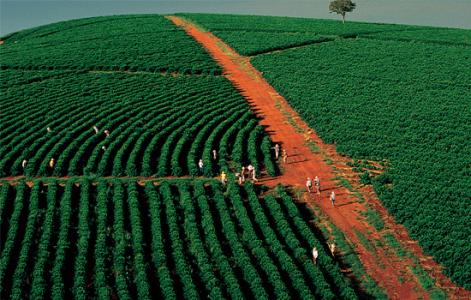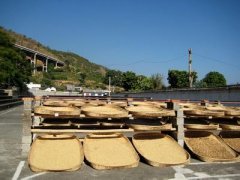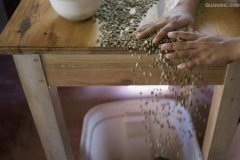A brief introduction to the flavor and aroma characteristics of Kenyan boutique coffee beans with fruit flavor

Kenya coffee has a wonderful fruity flavor, with a blackberry and grapefruit flavor, is a favorite of many coffee lovers. This coffee has an excellent medium purity, crisp and refreshing taste. Fresh flavor and best for iced coffee in summer. When tasting this coffee, if it is accompanied by fruit with acidity such as grapefruit, it will definitely give me the best coffee experience. "Less coffee, more fruit tea" is the common feeling many people have about this light roasted Kenyan coffee. In addition to its obvious and fascinating fruit acidity, Kenya coffee is mostly grown in a variety of environments from small coffee farmers.
Kenya's northern neighbor is Ethiopia, where the Arabica coffee tree originated, but it was not until the early twentieth century that coffee cultivation began. In the 19th century, missionaries introduced Arabica trees from Yemen, but did not plant them in large quantities. It was not until 1893 that they introduced the ancient Brazilian bourbon coffee seeds to cultivate coffee on a large scale. In other words, Kenyan coffee has Brazilian ancestry. Due to differences in water, climate and processing methods, Kenyan beans have a completely different flavor from Brazilian beans. Brazilian coffee is grown at low altitudes, with soft texture and no obvious fruit acid flavor. Kenyan coffee trees, on the other hand, are concentrated on the slopes near Mount Kenya, between 4,000 feet and 6,500 feet above sea level, which is suitable for coffee bean flavor development, because the mountain temperature is lower, the growth is slower, the aroma of coffee beans is fully developed, the fruit acid flavor is more obvious, and the texture is harder. In addition, Kenya was a British colony in the early days, and the British have established a complete system of cultivation and quality control. After independence, Kenya's coffee industry grew from an established base
The Kenyan government takes the coffee industry extremely seriously, and it is illegal to cut down or destroy coffee trees here. Kenya's coffee buyers are world-class buyers of premium coffee, and no country grows, produces and sells coffee as consistently as Kenya. All coffee beans are first acquired by the Coffee Board of Kenya (CBK), where they are appraised, graded and then sold at weekly auctions, where they are no longer graded. The Kenya Coffee Board acts only as an agent, collecting coffee samples and distributing them to buyers so that they can determine price and quality. High quality coffee Bright, delicious and slightly aromatic Kenya AA coffee is one of the rare good coffee, it is known for its rich aroma and balanced acidity, loved by many consumers. It is perfectly balanced and has a wonderful and intense flavor, fresh and not overbearing, a complete and not heavy taste experience.
Kenyan coffee is generally grown at altitudes of 1500 to 2100 meters and harvested twice a year. To ensure that only ripe berries are picked, local coffee farmers often make about seven rounds through the woods. Kenyan coffee is generally grown by small farmers who harvest the coffee and send fresh beans to cooperative washing stations, which send the washed and dried coffee to cooperatives in the state of "parchment beans"(coffee beans covered with endocarp)("parchment beans" are the final state of coffee beans before peeling). All the coffee is collected together and the grower charges an average price based on its actual quality. This method of buying and selling generally works well and is fair to both growers and consumers
Brazil Bourbon Santos Brazil is the world's largest coffee-growing country. Coffee is popular, but it's low-grade coffee. Because his country's altitude is generally relatively low, and is a large area of planting, manual harvest is difficult to implement, general mechanical harvest, so mature and green fruits will be mixed together, affecting the quality. In general, Brazilian Bourbon Santos coffee has no outstanding advantages, but there are no obvious defects, this coffee taste mild and smooth, low acidity, moderate alcohol, a light sweet taste, suitable for popular brewing methods, is the best raw material for making Italian espresso and all kinds of fancy coffee. Suitable for ordinary baking.
Colombia Premium Coffee (Columbia Supremo), geographical location, at the foot of the Andes (Andes), mild climate and humid air, no frost, undulating mountains provide a variety of climate and long growth cycle, creating its small particles, taste alcohol characteristics. This coffee is medium bodied, low in acidity, sweet in taste, with the best flavor and pleasing aroma. Some say that Colombia's premium coffee combines the rich lubrication characteristic of Sumatra mantinin with a special walnut bitterness and nutty taste, suitable for medium roasting.
Ethiopian Harrar, which has a blend of flavors, full-bodied taste, moderate or mild acidity, minimal caffeine content, and because there are residents still picking wild coffee, makes the most unusual and special coffee in the world. Its dry treatment gives it a unique earthy smell, a unique raw taste and a very aggressive character. Suitable for lighter baking.
Kenya A.A Because he and Yemen mocha and Ethiopia are very similar, they have a unique wine and long aftertaste, but, rare is, Kenya coffee has Ethiopia coffee and Yemen coffee do not have mellow and thick smooth, he is lighter than Ethiopia coffee wine, mocha alcohol than Yemen higher, so generally suitable for deep roasting.
If you know how to brew coffee without knowing how to taste it, the original taste may become tasteless. Some taste coffee is to use the tongue to feel the taste, and some enjoy the kind of aromatic alcohol in the mouth, in addition to this, but also depends on the body when drinking coffee, the surrounding atmosphere and so on. In short, coffee tasting is a very delicate matter.
When drinking coffee in a poor coffee shop, sometimes you will drink nearly half cold coffee. No matter how good the quality of coffee beans is, and how good the brewing skills are, you will lose your appetite for coffee. "Drink hot" is a necessary condition for tasting delicious coffee, even if it is hot coffee in the summer. When coffee is cold, the flavor will be reduced, so when brewing coffee, in order not to reduce the taste of coffee, the coffee cup should be soaked in boiling water in advance. The appropriate temperature of coffee is 83 degrees Celsius at the moment of brewing, 80 degrees Celsius when poured into the cup, and 61-62 degrees Celsius when it reaches the mouth.
Aromatic, rich, fruity, rich and perfect on the palate.
Important Notice :
前街咖啡 FrontStreet Coffee has moved to new addredd:
FrontStreet Coffee Address: 315,Donghua East Road,GuangZhou
Tel:020 38364473
- Prev

A brief introduction to the treatment methods of grinding degree and baking degree of a wide variety of Brazilian boutique coffee beans
Brazil is vividly compared to the giant and monarch of the coffee world. There are about 3.97 billion coffee trees there, and small farmers now grow 75% of Brazil's total coffee production. The number of coffee producers in Brazil is twice or even three times that of Colombia, which is the second largest coffee producer in the world. Brazil has many large farms and endless coffee plantations.
- Next

A brief introduction to the history and culture of the origin and development of Kenyan boutique coffee beans
Although the coffee auction system has effectively raised the price of high-quality coffee, it is not without drawbacks. First, the existence of many trade middlemen has eroded the interests of coffee farmers, and the high prices obtained from the auction can not be fully fed back to the hard-working coffee farmers. Second, it is difficult to accurately trace the production information of the auctioned coffee. For the increasingly prosperous boutique coffee market, traceability is the coffee raw bean review.
Related
- Detailed explanation of Jadeite planting Land in Panamanian Jadeite Manor introduction to the grading system of Jadeite competitive bidding, Red bid, Green bid and Rose Summer
- Story of Coffee planting in Brenka region of Costa Rica Stonehenge Manor anaerobic heavy honey treatment of flavor mouth
- What's on the barrel of Blue Mountain Coffee beans?
- Can American coffee also pull flowers? How to use hot American style to pull out a good-looking pattern?
- Can you make a cold extract with coffee beans? What is the right proportion for cold-extracted coffee formula?
- Indonesian PWN Gold Mandrine Coffee Origin Features Flavor How to Chong? Mandolin coffee is American.
- A brief introduction to the flavor characteristics of Brazilian yellow bourbon coffee beans
- What is the effect of different water quality on the flavor of cold-extracted coffee? What kind of water is best for brewing coffee?
- Why do you think of Rose Summer whenever you mention Panamanian coffee?
- Introduction to the characteristics of authentic blue mountain coffee bean producing areas? What is the CIB Coffee Authority in Jamaica?

